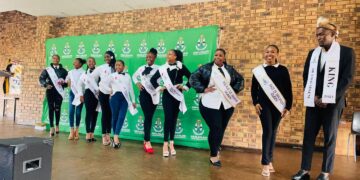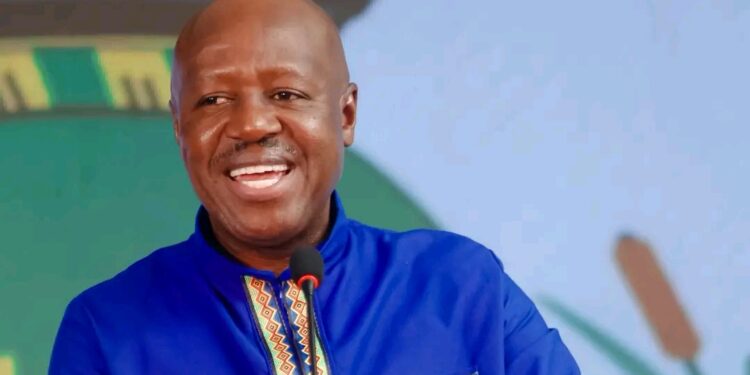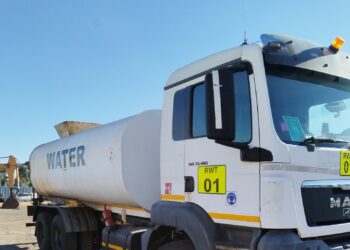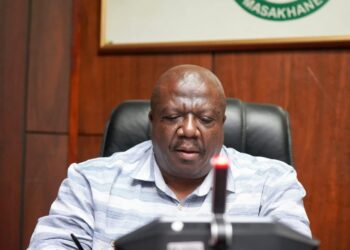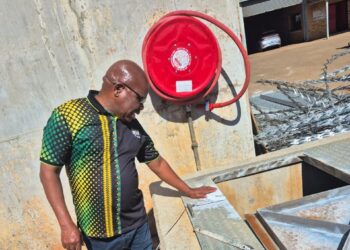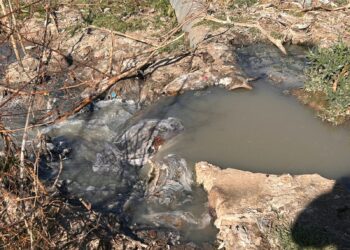Sheldon– Thembisile Hani Local Municipality mayor Lesetja Dikgale walked on stage of the Kusile Palace in the suburban Sheldon, where he laid out his vision in the 2025 State of the Municipal Address (SOMA) held on 08 August.
He did more than list municipal projects; he outlined a bold 2050 vision rooted in heritage. A vision to build a truly African City that is citizen centred and driven.
Mayor Dikgale announced the upgrade to the Mayoral Bursary Programme to cover registration, tuition and study materials, with R500 000 allocated for 2025/2026. Eligibility remains for THLM residents meeting academic and income criteria.
A further R2 million has been set aside to support NPOs, NGOs and community programmes, with a maximum of R80 000 per organisation. Dikgale confirmed that the annual support of R5 million continues for SMMEs and cooperatives.
He added that mass job creation projects and major mixed-use developments are currently underway, including the R1,3 billion Buhlebesizwe Precinct set to start in October, which will include a Sasol filling station, shopping centre and and private hospital, with future phases to include a Motor City, TVET College and residential housing.
While many townships and villages still face unreliable water supply, Dikgale said change was on the horizon. He highlighted a recently completed Bundu Weir project that will deliver 10 megalitres of water daily to communities such as Ekukhanyeni, Mthombomuhle, Entokozweni, Somphalali and Mthunjwa.
The Loskop Project, which aims to boost water supply by another 20 megalitres daily, is earmarked for completion by the end of the year. Upon completion, Dikgale said, this will provide water to residents from Mzimuhle to Phumula.
“For now, in December we are aiming to finish the Laskop project. People from Verena, Mzimuhle, Buhlebesizwe and Phumula the insufficient water crisis will be reduced,” said Lekgale.
Looking even further ahead, the Rand Water Project, expected to finish by 2030, promises to add another 30 megalitres per day. Dikgale believes this will finally end the community’s long-standing water shortages.
Growing prosperity from the ground up
When it comes to agriculture, the Mayor said, it is not just a tradition but a future economic engine for the municipality. A 49-year lease has been signed for Klipfontein Farms with Eventus Farming and this will see McCain becoming a guaranteed buyer for the produce.
The deal isn’t just about companies, small and medium-sized enterprises will hold a 50% equity share, ensuring that profits stay in the community.
If water and agriculture are the lifeblood of the city, infrastructure is its skeleton, the structure that holds everything together. Dikgale said the municipality’s economic ambitions include improved roads, smoother traffic and upgraded facilities.
The R573 Moloto Road upgrade by SANRAL is approaching completion. This project will ease congestion and open up new business opportunities along the route.
The Mpumalanga Department of Public Works is also upgrading key roads from Entokozweni to Zithabiseni, Mthombomuhle to Mthunja and Thembalethu to Cullinan.
The municipality currently has a pothole-free programme and beautification project that has already begun in Mandlethu and Tweefontein K.
Instead of relying on expensive contractors, the municipality has set up a new internal construction team which will soon take the Mthombomuhle Link Road as its first major project.
With new trucks, TLBs and a cherry picker for electrical work, service delivery will be faster and more reliable, said the mayor.
Sports, culture and pride
Dikgale’s vision goes beyond infrastructure, It’s about people and the spaces where communities come together. The Solomon Mahlangu Stadium now meets Premier Soccer League standards and the Kwaggafontein Stadium is expected to be completed by September 2025.
While the SOMA shows that Thembisile Hani is moving forward, with tangible wins in water, roads and economic partnerships, Dikgale said he is aware that challenges like water shortages won’t disappear overnight, alcohol and drug abuse continue to threaten young people.
A Vision rooted in heritage and modernisation
Dikgale said his vision is rooted in honouring traditional leadership and cultural heritage, while also driving modern, inclusive growth. Working hand-in-hand with amakhosi ensures that development respects community values, while still meeting contemporary needs.
“We can confirm that there’s an agreement in by-law between the municipality and traditional leaders that they will work together to improve the municipality, secondly we are fully behind the idea of uplifting the youth through farming projects,” said Siphosezwe Mahlangu, Mpumalanga Chairperson of Congress of Traditional Leaders of South Africa.
Dikgale’s speech was more than numbers; it was a call for shared responsibility.
Residents were urged to embrace unity, courage and active participation, with a reminder that no plan can succeed without their involvement. Whether it’s paying municipal bills, supporting local farmers or mentoring young people, the power to create change lies equally with the community.










